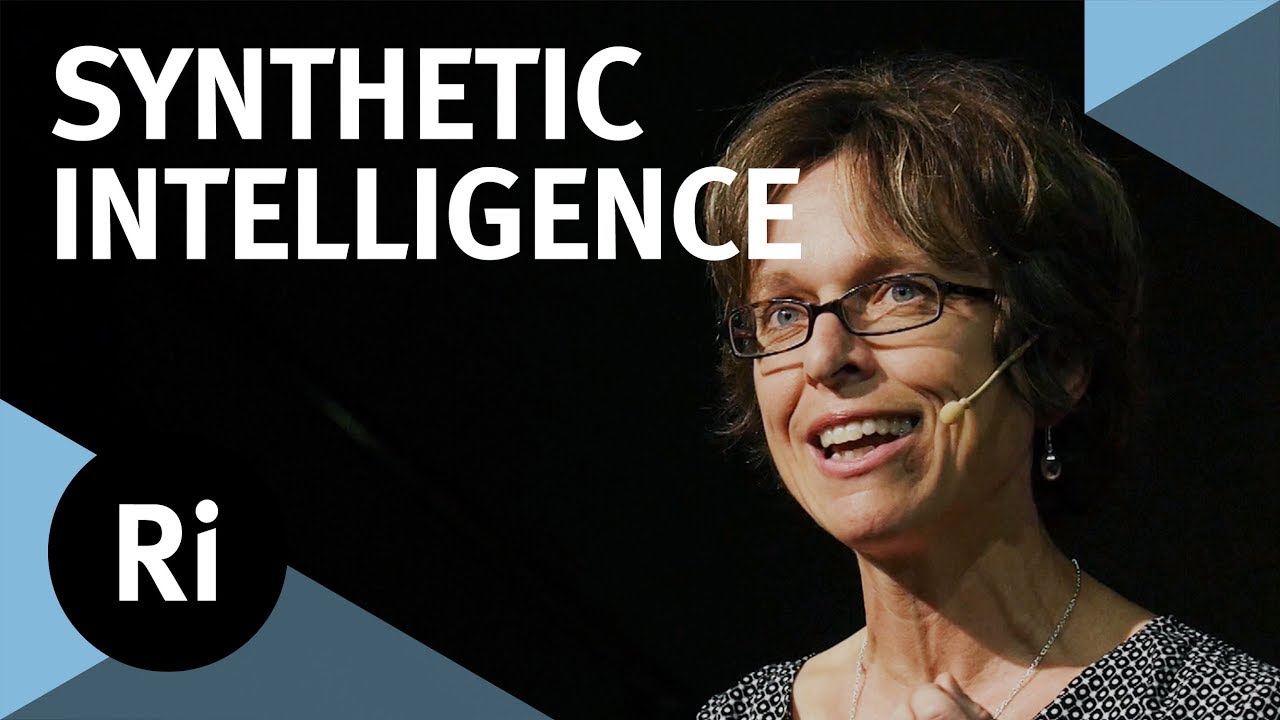The Royal Institution
Can machines be made to think like humans? And how does synthetic intelligence differ from artificial intelligence?
Subscribe for regular science videos: http://bit.ly/RiSubscRibe
How does the brain think? And more importantly, can we replicate thinking with a man-made device? Zdenka Kuncic will provide a tantalising glimpse into the possibility of synthetic intelligence in the not-too-distant future.
Watch the Q&A: https://youtu.be/TJtTywjOT20
Zdenka Kuncic is a Professor of Physics at the University of Sydney, Australia. Her research interests span medical and biological physics, and astrophysics and space science.
This talk and Q&A was filmed in the Ri on 26 July 2018.
—
A very special thank you to our Patreon supporters who help make these videos happen, especially:
Alessandro Mecca, Ashok Bommisetti, Avrahaim Chein, bestape, Elizabeth Greasley, Greg Nagel, Lester Su, Rebecca Pan, Robert D Finrock, Roger Baker, Sergei Solovev and Will Knott.
—
The Ri is on Patreon: https://www.patreon.com/TheRoyalInstitution
and Twitter: http://twitter.com/ri_science
and Facebook: http://www.facebook.com/royalinstitution
and Tumblr: http://ri-science.tumblr.com/
Our editorial policy: http://www.rigb.org/home/editorial-policy
Subscribe for the latest science videos: http://bit.ly/RiNewsletter
Source




When I was ten years old I was fascinated by the science of artificial intelligence and often pondered the question "can a human-made technology/machine ever truly become conscious?" Back then, I came to form the hypothesis that yes it is most likely possible that a man-made machine could exhibit genuine consciousness, but only as an emergent property stemming from the machine being fundamentally different at the hardware/physical level than a traditional computer using a software approach to AI. I've learned much about AI over the years, and my support for this hypothesis has grown.
I've long thought that software-based AI research is amazing, but is fundamentally the wrong approach, if the goal is true consciousness, due to the fact that software AI running on a traditional microprocessor could only ever be a simulation of intelligence and never truly achieve full conscious self-awareness since at the lowest level, even with complex machine learning, this "intelligence" is so drastically different to the organic machines that are animal brains in the real world. Animal brains are so far the only physical objects in the universe that appear to be conscious.
I've hypothesized that after decades more research and scientific breakthroughs in software-based, machine-learning AI and advances in traditional silicon microprocessors, that a powerful simulation of AI could most definitely solve complex real world problems presented to it as input and even appear 100% convincing to a human interacting with it, and even possibly surpass human intelligence in certain areas. But it would still not truly be conscious because it's not operating the same way as a natural brain at a hardware level.
For true consciousness in a machine, I always pondered that the only way to accomplish this would be to develop a physical device at the nano-scale that ingests, analyzes, processes, stores, and outputs information using networks of extremely parallelized, massively interconnected, adaptive, physical synapses. I don't think it matters what particular elements of physical matter those synapses are made of, and I don't think biological evolution is the only way to imbue matter with consciousness.
I believe it's possible for humans to engineer a real, fully conscious object, made out of whatever physical materials and elements, just so long as it uses electricity to send signals throughout deeply interconnected synthetic neurons that have the capability of being physically altered at the atomic level in order to store information even after the power is cutoff or reduced to a trickle.
I'm astonished and ecstatic because until watching this amazing lecture, I did not know that there were other scientists actively working on this who share the same philosophy that synthetic, human-made, conscious objects are attainable if they operate very similarly to real, organic neurons. I am overjoyed to discover that not only are they working on this, but they've made some seriously impressive progress with the materials science aspects of assembling a truly conscious, thinking, perceiving, learning machine!
Thank you Royal Institution for posting this! I would pay good money to listen to more from Dr. Zdenka Kuncic for many, many hours. This is the science and technology that excites me the most, it's just so extremely fascinating! I'd love for you to have her and her colleagues on again. 🙂
All human brains are damaged. Only our souls are perfect.
Seems like her research did not uncover computer wire wrapping: Those were in 3d and were the default before PCB took over… 50 years ago. This lecture feels like predatory publishing and reminded me of https://youtu.be/ras_VYgA77Q?t=21
Her synthetic intelligence is composed of numerous synthetic distinctions. Computational neuroscience is the direction one should go if they want to make a model of a physical brain.
This lady reinforces my idea that humans are the most evolved robots to date in "our world". We are self sufficient, self reproducing, extremely versatile and capable of "inventing " so many things that surround us. I hope our "maker(s) is proud of us. I keep wondering, who made our maker(s) ?
The computer that beat Gasparov wasn't called but Deep Blue, not Deep Mind, and it didn't use any kind of deep learning. This is very poorly researched.
I hope I'm dead before synthetic intelligence begins to understand how much more efficient life would be without humans getting in the way. Ai is the perfect example of how foolish smart ppl can be.
This woman has very little clue what she is talking about.
the name of the game is GO NOT alphago.
Could the neuromorphic nanotechnology be stacked in a kind of 3D tessellation?
In harari's latest book 21 lessons for the 21st century said that there's a huge misconception between the intelligent and conscious. We can make an intelligent but we can make a conscious, and conscious is one of the greatest mysterious in the universe some philosophers say the we can answer such a question.
This is a cringe-inducing example of just 'giving a talk'. It makes for a poor lecture because the speaker inadvertently demonstrates unequivocally that they have only superficial knowledge of the topic.
@17:30
Quantity changes quality.
Emergent properties.
@36:17
4IR: forgot total extinction by climate change armageddon aka geo-engineering gone haywire.
@39:45 – Alan Turing
That happened just recently, when even politicians dare to
use this vocabulary.
If it were not thoroughly established, a politician would never
risk a career on it.
Gravity also seems to be emergent..
40 minutes of meaningless junk…
When physics tries to mimic the brain it is still just colloid (soft matter) science, not systems biology, nor synthetic intelligence. This physics professor should try to join the IGem competition and then come back.
She doesn't define "intelligence"
I don't understand why you need hardware for that? Isn't it much more convenient an d computationally equivalent doing it in software?
Where can one find out more about this technique and application?
Dumbed down hooey, skip it. 15 y.o.
Q/A link is wrong. it points to different video.
The lady was putting me to sleep with forever repeating the same dialog over and over. If you are going to talk about Synthetic Intelligence then do so. Yeah we already know what AI is so why are you spending 20 minutes mumbling about it?
Dear God!!! Get to the point Lady!!! So much Fluffy, little being said.
Frankenstein.
30:11 looks eerily like the biological brain
Teaching a synthetic system how to recognize a "2" or "1" character is wrong way to emulate the brain. Low order numbers are distinct "counts" in the brain. So whether you have two hippos or two rocks, the emergent intelligence about counting stuff works out same result. Higher numbers than typically "3" are more elaborate constructs in the brain, as bigger numbers (of real world objects) the brain fails to instantly discern.
Teaching a computer an arabic symbol for "2" in a font..only takes the research down the old path of exactly same neural-net training decades ago.
Our brains dont store exact images to match against or recall.
Nobody has produced anything yet that would be worth calling "AI". All we have is pattern recognition thickly covered in rampant gratuitous hype.
call it "synthetic programation" is not the same that "intelligence", if you are just executing commands in order, for what it is in fact, you are not making "intelligence".. maybe, is just my opinion. Robots, They are not alive, they seem alive, is not the same. Or you can call it "an illusion of life".. good name for a movie 🙂
only if inteligence was the propperty of matter, but it's not…